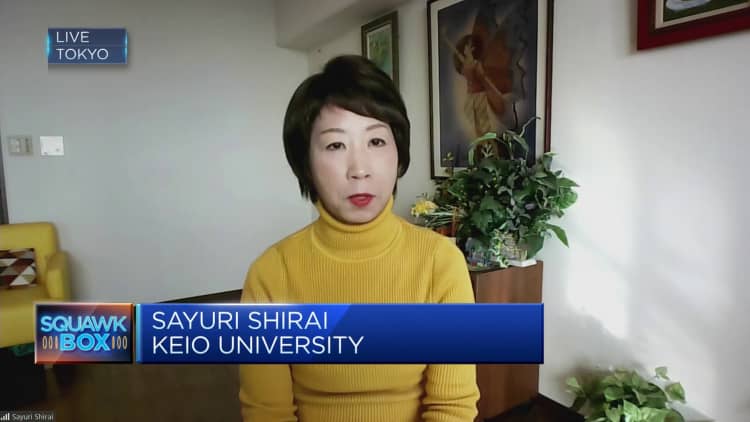
An editorialized picture of a falling graph against the Japanese flag.
Natanael Ginting | Istock | Getty Images
Japan’s central bank is expected to exit its negative interest rate regime this spring, though sluggish growth will limit its ability to alleviate depreciation pressure on the yen, according to a former Bank of Japan board member.
BOJ Governor Kazuo Ueda is under pressure to stem yen depreciation driven by the divergence between high U.S. interest rates and Japan’s ultra easy policy. Yet, he is also constricted by high inflation that BOJ policymakers still deem unsustainable, even as it crimped domestic demand and tipped the economy into a technical recession. That surprise contraction meant Japan’s economy is now the world’s fourth largest, falling behind Germany.
“It’s a serious challenge and dilemma,” Sayuri Shirai, an economics professor at Keio University in Tokyo, told CNBC’s “Squawk Box Asia” on Thursday. She previously served as a member of BOJ policy board from 2011 to 2016, helping to make monetary policy decisions.
“However, I think BOJ is likely to take some policy change, including [the] removal of negative interest rates this spring, because I think they worry about side effects,” she said.
The yen retreated to around 150 to the dollar this week after U.S. inflation data came in higher than expected, dousing hopes of a quicker Federal Reserve rate cut. The yen’s chronic weakness has diminished not only the purchasing power of consumers in Japan, but also the value of the country’s exports.
“I think they want to take this opportunity to do some adjustments, and also more market participants anticipate that BOJ will do some normalization this spring. So regardless of whether BOJ is able to achieve 2% in stable manner, I think BOJ will take some policy change this spring,” Shirai added.
Between a rock and a hard place
Even if BOJ policymakers deem inflation is still not sustainably driven by domestic demand, the prolonged high inflation rates have hit domestic consumption — a key reason driving the second consecutive contraction in Japan’s GDP in the fourth quarter.
While inflation has been gradually slowing, “core core inflation” — which excludes food and energy prices — has exceeded the BOJ’s 2% target for more than a year.
At its January meeting, the BOJ decided unanimously to keep short-term interest rates at -0.1%. It also stuck to its yield curve control policy, which keeps the upper limit for 10-year Japanese government bond yield at 1% as a reference.
BOJ policymakers have been cautious and fastidious with their primary task: reflating an economy that’s been mired in decades of deflationary pressures.

Many in the market expect the BOJ to move away from its negative rates regime at its April policy meeting, once the annual spring wage negotiations confirm a trend of meaningful wage increases. The central bank believes wage increments would translate into a more meaningful spiral, encouraging consumers to spend.
But former BOJ policy board member Shirai said currently Japanese yen-denominated wages and household consumption are both dropping.
“And so, there is no sign to see this about your cycle between price and wages and [consumer] demand. So in this sense, It’s quite difficult for BOJ to take [the path of] normalization, even though inflation can be above 2% for some time,” she added.
“But at the same time, this interest [rate] differential creating huge depreciation [pressure for the Japanese yen] … so you see it’s very difficult to raise interest rates.” Shirai said.
“So even if Bank of Japan raises interest rates a little bit, BOJ has to say they cannot do … continuous interest rate hikes because the economy is weak. If they do some normalization, [it would be] just [the] removal of negative interest rates — then it doesn’t really have much impact on the depreciation of the yen.”
— CNBC’s Lee Ying Shan contributed to this story.

